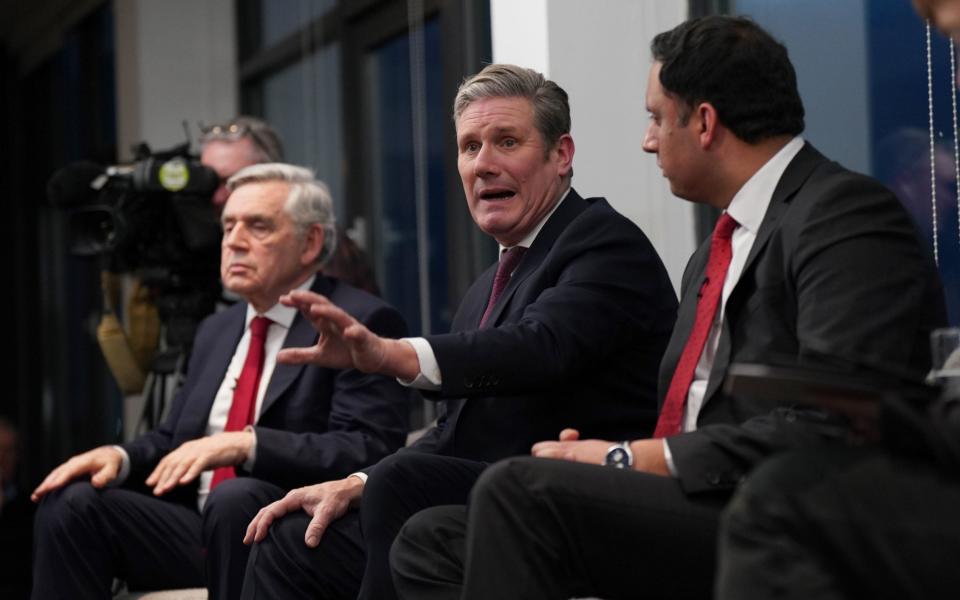Keir Starmer pours scorn on Nicola Sturgeon’s ‘de facto’ independence referendum

- Oops!Something went wrong.Please try again later.
- Oops!Something went wrong.Please try again later.
- Oops!Something went wrong.Please try again later.
Sir Keir Starmer has said Nicola Sturgeon's plan to use the next general election as a “de facto” independence referendum defies "common sense", as he made clear he will reject it if he becomes prime minister.
The Labour leader poured scorn on the idea that the First Minister could turn an election dealing with a wide array of domestic issues, such as the cost of living crisis, into a vote on separation.
Speaking on a visit to Scotland, Sir Keir said "no amount of discussion" by Ms Sturgeon would change the terms of the election from giving people the choice between a Labour and a Tory UK government.
He said a Labour government would have its own electoral mandate after the general election to implement the constitutional reforms outlined in its manifesto.
Similarly, he made clear that he would not consider the First Minister to have a mandate to open negotiations with the UK Government on independence, regardless of the result in Scotland.
With Rishi Sunak, the Prime Minister, having previously rejected Ms Sturgeon's plan, it would appear that it has no prospect of success regardless of whether Labour or the Tories form the next UK government.
However, his dismissal of her proposal is particularly significant, given Labour's commanding lead in the polls and the prospect of him becoming prime minister.
'No clear majority' for another separation vote
Ms Sturgeon has resorted to claiming that the next general election, expected in 2024, is a “de facto” independence referendum after the Supreme Court ruled she does not have the power to stage her own separation vote next year.
To the dismay of some of her MPs, who fear losing their seats, she has pledged to fight the election on the single issue of separation, then claim a mandate to open negotiations with the UK government if separatist candidates win more than 50 per cent of the popular vote in Scotland.
But Gordon Brown, the former prime minister, also rejected the plan - saying Labour would fight the contest on issues such as the cost of living, the NHS, jobs and the environment.
He pointed out it was a "UK general election" and there was "no clear and decisive majority" in opinion polls supporting the staging of another separation vote.
Sir Keir and Mr Brown appeared at a joint event in Edinburgh with Anas Sarwar, the Scottish Labour leader, launching the party's wide-ranging blueprint for constitutional reform of the UK.

The report, written by a commission headed by Mr Brown, recommended replacing the House of Lords with an elected "assembly of the nations and regions" and giving Holyrood a binding veto over devolved issues.
Sir Keir promised that a Labour government would implement the plan and argued it meant that Scottish voters would no longer be faced with a choice of independence or the status quo.
Instead, he contrasted the SNP and Labour manifesto offers by arguing "change by leaving the UK goes up against change within the UK".
But he rejected putting the proposals to Scottish voters in a referendum, alongside independence, or considering the election to be a vote on separation.
Sir Keir said: "It is a general election between carrying on with the Conservative government or changing it to a Labour government. No amount of discussion by other people is going to change the terms of a general election.
“That is what a general election is about - what government do you want to lead on the economy, on international matters, or security, on defence, on conflict in Ukraine, on the health service, or the cost of living, the energy crisis?
“These are not issues that can be reduced by somebody else into a completely different constitutional question. That is what a general election is about - all those issues.
“And the idea that all of that is as naught, nobody is interested in those questions, we're arguing about something that Nicola Sturgeon defines in that way, is just to stand in the way of common sense of what a general election is about.”
Sir Keir reiterated that "I won't do a deal with the SNP" to get into 10 Downing Street if there is a hung parliament.
Labour 'utterly hypocritical'
A spokesman for the First Minister said: "Labour’s position is utterly hypocritical and merely underlines their anti-democratic credentials.
“They will claim a mandate for their constitutional proposals regardless of whether or not voters in Scotland endorse them, and yet they will simultaneously stand shoulder to shoulder with the Tories in blocking the cast-iron democratic mandate which exists for an independence referendum. That stance is simply unsustainable."

